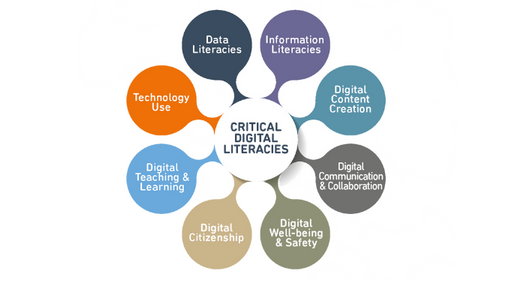A guide for school teachers and students to rethink tech
Subject: Psychology and Educational Sciences
If you are a primary or secondary school teacher, this guide on digital literacy is for you!
"This is what we call critical digital literacy: stopping to think and observe how a technology affects us and consider whether we want to continue using it"
Can I make use of social networks in the classroom, or will I be exposing students to cyberbullying? If I use learning platforms in school, where will the students' data end up? How can I make students aware of the dangers of revealing too much online? The lockdown caused by the COVID-19 crisis has intensified the use of information and communication technologies (ICT) in education and given rise to numerous opportunities, but also to new challenges and questions for educators.
"Critical digital literacy" is a library guide designed to provide support for primary and secondary school teachers in the use of ICT and social networks in the classroom, above and beyond the acquisition of basic technical skills. The activities, courses and materials it includes aim to help teachers make informed decisions by enabling them to weigh the tech's pros and cons and then convey them to their students.
In the words of Juliana Raffaghelli, member of the Edul@b research group and one of the guide's creators: "This is what we call critical digital literacy: stopping to think and observe how a technology affects us and consider whether we want to continue using it. […] In doing so, we are not renouncing the creative, positive side, the problem-solving or democratic access to technologies. Quite the contrary, we are broadening our view, taking on a position of active control."
"We are broadening our view, taking on a position of active control"
The "Critical digital literacy" library guide has been produced as part of the European Erasmus+ DETECT (Developing Teachers' Critical Digital Literacies) research project. The content has been selected by UOC researchers Teresa Romeu, Juliana Raffaghelli, Marc Romero and Dèlia Español from the Edul@b group. Contributions have also been made by experts from other European universities.
What will you find in this library guide?
The content has been chosen using the DETECT project's digital literacy framework, a roadmap featuring the eight key dimensions that need to be taken into account for a critical focus on technologies, which range from data literacies to digital well-being and safety.
The theoretical framework's dimensions and sub-dimensions have been defined based upon a review of existing literature, gathering the opinions of teaching staff and the conclusions of different working groups.

"The difference between this resource and many others to be found online is its holistic vision, which covers many of the critical situations in the use of technologies," said Raffaghelli.
Some examples of what the library guide offers:
- An exercise created by Edul@b to help teaching staff and students to assess how social networking services, apps and digital services like Google Classroom process user data.
- A social media literacy project called Data Smart Kids, which suggests open access activities and a free chat app to carry out workshops with children aged 8 to 12. The app gathers information on students so that teachers can discuss with them the use of personal data for commercial purposes.
- An introductory lesson on how to make the most of e-book readers.
- A guide with good practices so that students can sort through information and find quality content on Wikipedia.
- A lesson plan with a series of free activities and resources to help young children think about the online identity they are shaping with their selfies and social media presence.
- Resources and activities encouraging students to think about online networking to find work.
- A set of tools and resources to help teachers design online courses.
All the content is open access, available to all, and is designed for practical use in the classroom. The resource is part of the SOLET: Self-Organised Learning Environment for Teachers, developed by the research project.
Committed to digital transformation in education
Providing teachers with digital skills is part of the UOC's commitment to facilitate digital transformation in the world of education. Since the arrival of the pandemic, the UOC has been sharing its experience in online learning with teachers all around the world, with initiatives such as its emergency remote teaching resources, which have now been consulted almost 170,000 times, and the book Decàleg per a la millora de la docència en línia. Propostes per educar en contextos presencials discontinus (Ten keys to improving online teaching: solutions for education with intermittent attendance), which has been downloaded more than 1,124 times.

